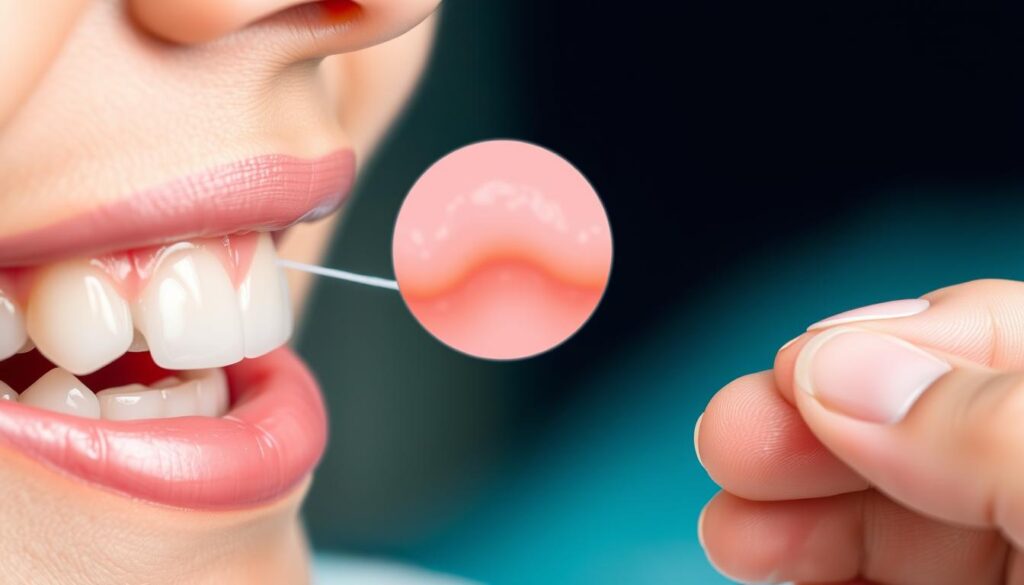Will the Dentist Scold Me for Not Flossing or for Having Cavities?

Over 30% of adults in the United States don’t floss every day. This surprising fact shows a lack of dental hygiene practices noticed during a dental check-up. Many fear their dentist will scold them for their oral health habits—or lack of them. The focus on oral health is to have informative talks about preventing cavities and good dental care, not scolding.
Dentists try to help patients adopt healthier habits. Being honest in appointments helps them assess your needs properly. This isn’t about judging. It’s about making personal plans to prevent cavities and enamel erosion. Each visit is a chance to learn how to keep your smile bright.
The worry about dental visits can hide the real goal of dentists. They want to help you have strong, healthy teeth and teach you the best ways to care for them. Talking openly with your dentist can help improve your oral health and prevent pain from dental issues.
Key Takeaways
- Fostering honest discussions about dental habits prevents the need for scolding and enhances patient education.
- Dental check-ups serve as a valuable moment for learning how to improve your oral hygiene routine.
- A proactive approach to preventing cavities involves personalized advice from your dentist based on your unique dental profile.
- Developing a stronger relationship with your dentist can demystify dental visits and promote better oral health practices.
- Understanding the educational role of dentists can alleviate anxiety and create a collaborative environment for optimal oral care.
Understanding the Dentist’s Perspective
Going to the dentist is more than about fixing teeth problems. It’s about stopping cavities and other issues before they start. Dentists focus on preventing problems. This way, you won’t get cavities or other oral health troubles. If you get this, you and your dentist can work better together for your oral health.
The Role of Preventative Care
Preventative care is all about keeping your teeth and gums healthy. It stops gum diseases and cavities from getting worse. It includes cleanings at the dentist and taking care of your teeth every day. Brushing, flossing, and eating less sugary food are key to keep cavities away and make your oral health better.
Importance of Communication with Your Dentist
Talking openly with your dentist is very important for your dental care. When you’re honest about how you take care of your teeth, your dentist can offer better advice and treatments. They might suggest better ways to brush or recommend products that are good for you. This way, you avoid getting scolded and your visits are more helpful and supportive.
To wrap it up, good preventive care and talking with your dentist are key for great oral health. When you understand and work with your dentist, you get care that helps prevent problems, not just fix them.
Why Flossing is Essential for Dental Health
Flossing is key to keeping your mouth clean. Yet, many overlook it, guided by myths or lack of knowledge. Learning about flossing’s benefits is crucial for better oral care.

Benefits of Daily Flossing
Flossing daily gets rid of food and plaque that a toothbrush misses. This simple habit leads to big benefits for your teeth:
- Prevention of gum disease by removing particles and plaque between teeth and along the gum line.
- Reduction in dental plaque build-up, which can lead to tartar if not properly managed.
- Contribution to better breath by eliminating food particles that contribute to bad odors.
- Helps in preserving tooth structure by preventing decay that often begins between teeth.
Common Misconceptions about Flossing
Some wrong beliefs stop people from flossing regularly. Correcting these views can improve oral health:
- Bleeding gums during flossing signal harm: Bleeding often shows inflammation due to not flossing enough. Flossing more reduces this over time.
- Sporadic flossing is enough: Consistency is key in flossing, as irregular habits do not prevent plaque build-up effectively.
- Flossing is unnecessary if teeth appear clean: Invisible particles and plaque still gather and can harm your teeth.
Understanding and using these tips can boost your oral health. Flossing daily keeps dental issues away and supports your overall wellbeing.
What to Expect During Your Dental Visit
Going to the dentist might make you feel unsure, especially about the dental examination part. We’ll explain the steps of a usual dental check-up here. This will clear up what your dentist’s approach is about and its impact on your oral health.
The Examination Process
A dental visit mainly aims to check your teeth, gums, and mouth closely. This deep check-up helps catch any early signs of problems like cavities or gum disease. In a dental examination, you can expect a few key steps:
- Looking closely at your teeth and gums for signs of decay or disease.
- X-rays might be done to see how your teeth and roots are placed under your gums.
- Checking for oral cancer by looking at your neck, throat, face, and tongue.
- Checking your fillings and crowns to make sure they’re still good.
This full exam is key to tackle any dental issues early and is super important for keeping your teeth healthy.
Addressing Your Concerns
Getting to talk about your worries or fears about dental health is a big part of your visit. Open talks with your dentist help make your care just right for you. It doesn’t matter if you’re worried about daily tooth care, pain, or being nervous about treatments, your dentist is there to help. This talk helps a lot both for your current visit and keeping your teeth healthy in the future.
Knowing what happens in a dental check-up can really help reduce stress and encourage you to care for your oral health. Remember, every dentist visit helps keep your overall health in check.
Do Dentists Really Scold Their Patients?
The idea of dentist scolding might make one think of discomfort and harsh words about not taking care of teeth. However, most dentists care more about teaching than telling off. They want to help you understand and build good habits for keeping your mouth healthy.
Dentists and patients often have dental discussions during visits. These talks are chances to learn and get better at oral hygiene. For example, a dentist might talk about why it’s important to floss and how good habits can improve mouth health. This turns what could be a scary visit into a chance to learn, showing how habits affect both dental and overall wellness.
Effective communication between dentists and patients is very important.
- Building Trust: Being open and honest helps create a trusting bond. This makes patients more open to advice.
- Customized Oral Hygiene Tips: Dentists give advice meant just for you, making your dental care routine even better.
- Preventive Education: During these talks, patients learn about how to keep their mouth healthy and about new ways to care for their teeth.
So, you shouldn’t be scared of getting lectured at the dentist. Think of your dental visits as key chances to better your oral health with helpful advice. This approach makes going to the dentist a positive experience, where the focus is on care instead of criticism.
The Consequences of Not Flossing
Having good flossing habits is key for optimal oral health. It helps prevent gum disease and cavities. Not flossing can lead to major issues for both your teeth and overall health. Knowing the dangers helps you take better care of your teeth.
Gum Disease and Cavities
Not flossing enough can cause plaque to build up. Over time, plaque turns into tartar. Tartar can cause gum disease. This disease affects your gums and the bones supporting your teeth. It can make your gums red, swollen, and bleed. Without treatment, gum disease can get worse. This can make you lose your teeth and lead to other health problems.
Also, not flossing leaves food and sugar between your teeth. This creates the perfect place for cavities to start. Flossing helps remove these bits of food. It’s a vital step in stopping cavities.
Poor oral health affects more than just your mouth. Studies show that severe gum disease can link to diseases like diabetes, heart disease, and lung issues. Therefore, flossing well not only keeps your teeth healthy. It also helps your whole body stay healthy.
To show how bad flossing habits affect your health, look at these connections:
| Oral Health Neglect | Dental Consequences | Extended Health Impacts |
|---|---|---|
| Poor flossing habits | Increased plaque buildup | Risk of heart disease |
| Sporadic or incorrect flossing | Development of cavities | Potential diabetic complications |
| No flossing | Advanced gum disease (periodontitis) | Heightened risk of respiratory infections |
In summary, flossing daily is essential. It’s not just a recommendation; it’s a must for keeping both your teeth and body healthy. Making flossing a priority prevents many health issues. This highlights its importance in overall health care.
Addressing Cavities and Tooth Decay
It’s key to spot cavities early to fight tooth decay and keep your dental health top-notch. Look out for a constant toothache, feeling too much when eating hot or cold things, and seeing dark spots or holes on your teeth. Knowing these signs helps stop cavities and improves how well you take care of your teeth.
When you notice tooth decay, dentists have several ways to fix and stop more damage. They might use:
- Fillings: Dentists use tooth-colored materials or silver to fill holes after removing the decayed parts.
- Crowns: If decay is bad, they put a custom cap on the tooth to make it look and work right again.
- Root Canals: When decay hits the nerve, a root canal takes out the bad nerve and seals the tooth.
These treatments help stop tooth decay and keep your teeth healthy. Finding and treating decay early matters a lot for good dental health. It’s about acting early to keep your mouth healthy.
Quickly dealing with cavities not only stops pain but is also key for mouth health. This shows why seeing your dentist regularly and following their advice on taking care of your mouth is very important.
Overcoming Dental Anxiety
Many people feel scared when it’s time to visit the dentist. This fear often comes from worrying about being judged on their dental health. It’s important to deal with this fear for the sake of your teeth and your mind. Finding a dentist who is understanding and supportive can help make visits easier.
Here are ways to feel less scared:
- Open communication with your dentist about your dental anxiety and specific fears.
- Finding a clinic that emphasizes supportive dental care, prioritizing patient comfort and understanding.
- Requesting information on each step of dental procedures to demystify the process and reduce stress.
Having a supportive dentist and clinic makes a big difference in overcoming fear. When you feel welcomed and understood, going to the dentist becomes easier. Tips to create a good dental visit experience include:
- Scheduling appointments at less busy times to ensure a calm setting.
- Bringing a friend or family member for emotional support during appointments.
- Utilizing soothing techniques such as guided imagery or calm breathing exercises before and during the dental visit.

Building a Better Oral Care Routine
Having a solid oral care routine is key to good dental hygiene. There are several steps that, if followed every day, can greatly improve your oral health. This can prevent a lot of common dental problems.
One big step for better dental care is making sure to floss daily. Flossing removes plaque and bits of food that brushes miss between your teeth. Doing this can hugely lower your chance of gum disease and cavities.

It’s also good to improve your oral health habits even more. Cutting down on sugary foods and drinks, stopping tobacco use, and drinking less alcohol help a lot. These habits protect your gums and teeth, completing your dental hygiene routine.
To know more about how often to get dental cleanings and check-ups, you should look at this detailed guide. It’s a big part of keeping your mouth healthy.
A good oral care routine doesn’t just help your teeth but also your overall health. Start making flossing a must-do every day. With these changes, you’re on your way to great oral health and a bright smile.
Questions to Ask Your Dentist
It’s key to visit your dentist often to keep your mouth healthy. Being prepared at your dental check-up can help you understand how to stop common mouth problems. Here are some important questions to ask at your next visit.
Clarifying Your Oral Health Obligations
Talking openly with your dentist is the first step to knowing your mouth’s needs. Ask about the best flossing habits for you and how to do them. Also, find out which products are good for stopping cavities and keeping your mouth healthy.
Discussing Flossing and Cavity Prevention
Flossing gets rid of bits that your brush can’t. Talk about how to floss better to prevent cavity prevention and the right tools for you. Also, learn how what you eat affects your teeth and how to protect them from decay.
- How often should I schedule my dental check-ups for optimal oral health?
- What are the most effective flossing techniques and tools?
- Can you recommend any specific products for my oral hygiene routine?
Asking these questions helps you take charge of your mouth’s health. This way, you can stop problems before they start.

The Role of Education in Dentistry
In the dental world, teaching is key. Dentists don’t just fix teeth problems. They also teach patients how to take care of their teeth. This kind of education helps people understand why it’s important to keep their teeth clean.
How Dentists Educate Patients
Dentists share oral health tips in many ways. They show how to brush and floss right. They talk about how food affects your teeth and what happens during dental treatments. This helps patients know how to look after their teeth well.
Resources for Better Dental Care
Being able to reach dental care resources is crucial for good dental education. Dentists give out brochures, share websites, and show videos. These tools help patients pick the best care for their teeth. They also teach how to keep good oral hygiene.
- Interactive Websites: Many dental offices offer websites. Here, patients can learn about symptoms, treatments, and how to avoid problems.
- Workshops and Seminars: Some places have classes about flossing, dealing with gum disease, and the link between mouth and body health.
- Personalized Care Plans: Dentists customize learning materials based on what each patient needs. This makes learning about dental care better for everyone.
Dentistry education mixes talking to patients directly with giving them dental care resources. This mix helps patients take an active role in their oral health. It leads to a community that knows more about dental health. This means everyone ends up healthier.
The Importance of Regular Check-Ups
Maintaining good oral health means going for regular dental check-ups. These are key for preventing problems with your teeth and gums. It’s vital to visit the dentist as often as they suggest. Doing so helps spot problems early, which is essential for keeping your teeth healthy.
Dental experts say you should see a dentist every six months. These visits help find problems like cavities or gum disease early. They also let your dentist do things to stop these issues from getting worse.
- Assessment of overall oral hygiene and health
- Detection of hidden dental problems through x-rays
- Professional cleaning to remove plaque and tartar
- Guidance on improving dental care routines at home
Finding problems early means your teeth and gums can stay healthy. It also means saving money and avoiding big treatments.
For more info on why you shouldn’t wait to visit the dentist, check out “My Tooth Broke But It Doesn’t Hurt; Do I Still Need to See a Dentist. It talks about how regular dental check-ups are key for oral health.
Handling Dentist Feedback Constructively
Getting dentist feedback is a chance to improve how you look after your teeth. It’s vital to see these moments as teamwork towards better oral health. Let’s see how feedback can help us improve and make a positive dental relationship.
Your dentist’s constructive feedback is a key guide to better dental health. It highlights what needs work. Taking this advice seriously helps you boost your oral care practice.
- Clarify and Understand: Ask for clear examples and tips on fixing the mentioned issues.
- Set Realistic Goals: Create achievable health goals with your dentist’s help for better care at home.
- Follow Through: Change your daily habits as suggested and check the progress on your next visit.
Keeping a good communication line with your dentist helps solve teeth problems fast. It also makes a positive dental relationship that lasts and helps in getting personalized care plans.
By being open to dentist feedback, you can change worry into useful talks. This not only betters your dental health but also strengthens your bond with your dentist. Remember, seeing the good in feedback can change issues into chances for better health.
Flossing Alternatives for Better Dental Hygiene
Traditional flossing can be hard for some people. This is because of sensitive gums, braces, or just personal taste. Knowing about different oral care tools can change how we take care of our teeth. It can introduce effective flossing alternatives for better dental health.
It’s not hard to find a good substitute for regular flossing. This guide will introduce you to modern methods for great oral health:
- Water Flossers: These use a stream of pulsating water to clean between your teeth. They are great for anyone with braces or permanent retainers.
- Interdental Brushes: Their small brush tips fit between teeth, making it easy to clean spots that are hard to reach. They’re simpler to use than regular floss.
- Soft Picks: Made of soft rubber, these picks move easily between your teeth. They remove plaque and debris gently, without the discomfort string floss might cause.
Each option offers unique advantages for different dental care needs:
| Tool Type | Primary Benefit | Ideal For |
|---|---|---|
| Water Flossers | Effective plaque removal | Braces and other dental devices |
| Interdental Brushes | Ease of use and accessibility | Small gaps and wide spaces |
| Soft Picks | Soft, flexible use | Sensitive gums |
Talk to your dentist before choosing one of these tools. They can help pick the best one for your mouth. Using the right flossing alternative can improve your dental care routine. It helps keep your teeth healthy.
Embracing a No-Scolding Dental Visit
Dental care has changed a lot. Now, it’s about being supportive and teaching rather than scolding. This new way aims to make people feel important and eager to take care of their teeth. The scary old dental visits are being replaced with positive ones, making going to the dentist a better experience.
Fostering a Positive Dental Experience
Modern dental offices make sure every part of your visit makes you feel respected and helps you reach your health goals. Right from the start, you’re greeted warmly, without any judgement. They focus on teaching and motivating you to keep your teeth healthy. This caring connection leads to better results and more people taking care of their teeth.
The Dentist’s Commitment to Your Health
A dentist’s job is more than just fixing teeth problems; it’s about teaching, preventing issues, and paying attention to each patient. This approach focuses on keeping you healthy for the long run. Dentists try to make clear, kind communication a priority. This helps build trust and teamwork in taking care of your dental health.


